
April 20, 2024

February 2009 | Vol. VIII - No. 2
Toy Fair 2009 Overcomes Doom and Gloom
Low Prices and Quality Traffic Define 106th Annual Toy Show
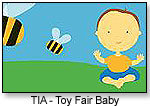 Toy Fair 2009, Feb. 15-18, managed a decidedly positive buzz despite recession woes and admitted hardships over compliance with the lead- and phthalate-restricting CPSIA. New York City’s Javits Center saw more than 1,100 exhibitors, down from last year’s 1,200+, and is estimated to have welcomed 10,000+ retail buyers, according to the Toy Industry Association. Although foot traffic seemed to be about 25 percent lighter than last year, given the drop of roughly 3,000 buyers, the show still held a promising vibe.
Toy Fair 2009, Feb. 15-18, managed a decidedly positive buzz despite recession woes and admitted hardships over compliance with the lead- and phthalate-restricting CPSIA. New York City’s Javits Center saw more than 1,100 exhibitors, down from last year’s 1,200+, and is estimated to have welcomed 10,000+ retail buyers, according to the Toy Industry Association. Although foot traffic seemed to be about 25 percent lighter than last year, given the drop of roughly 3,000 buyers, the show still held a promising vibe.
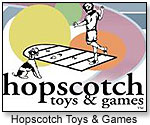 "Toy Fair has been a lot more positive than I expected. There's no dark cloud,” Linda Hays, owner of Hopscotch Toys and Games in McMinnville, Ore., told TDmonthly Magazine. “There's less development of new product, but what there is, is good."
"Toy Fair has been a lot more positive than I expected. There's no dark cloud,” Linda Hays, owner of Hopscotch Toys and Games in McMinnville, Ore., told TDmonthly Magazine. “There's less development of new product, but what there is, is good."
Financial pressure and new safety demands did squelch innovation to some extent, but companies demonstrated adaptation to shoppers’ limited budgets and national regulations by launching lower price-point items and changing materials or even cutting questionable products from their lines.
“Companies are smart and fast on their feet” in terms of meeting new safety standards, “and are concentrating on low price tags,” Carter Keithley, president of TIA, told TDmonthly.
PRICES UNDER PRESSURE
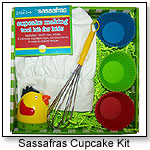 “Everything we’re trying to bring in is $19.99 and under,” expressed Christopher Grzych, sales facilitator for Sassafras. “People have to buy something; they just don’t have to go deep.”
“Everything we’re trying to bring in is $19.99 and under,” expressed Christopher Grzych, sales facilitator for Sassafras. “People have to buy something; they just don’t have to go deep.”
This is promising because, as buyer Erin Staebell of Pufferbellies in Staunton, Va., pointed out during TDmonthly’s Toy Fair Tour for retailers, many parents are seeking birthday gifts under $10, “and that’s it.”
Jonathan Segal, general manager of Boikido, still believes specialty shoppers can spend $20 to $30 on toys regardless of the recession, but said his company is “being very conscious of price levels in designing for 2009 and 2010.”
One such example of modifying product to fit a lower price range is Merillian’s new Flibbix Express, which, at $25 retail, boasts a price tag $15 less than the original version.
ORDERS ON EDGE?
Several exhibitors noted hesitancy on the part of buyers, with a couple of comparisons to the disappointing, almost non-existent sales at the New York International Gift Fair that took place in January.
 “You just missed a major event … we wrote an order,” half-joked Barry Unger at the Kamhi World booth on Monday.
“You just missed a major event … we wrote an order,” half-joked Barry Unger at the Kamhi World booth on Monday.
Others, however, noticed more substantial returns.
“We hit our sales goal for the show on Sunday,” remarked a representative at Wild Creations.
While Wild Creations’ expectations for sales were admittedly low, Jesse DenHerder of Education Outdoors assured TDmonthly the show’s attendees represented “quality over quantity. The people that are here are serious,” he said.
At the Schoenhut booth, they surpassed the last two years of Toy Fair orders by the third day of the show.
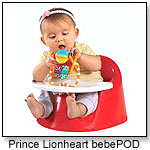 Prince Lionheart encouraged sales by waiving minimum orders, offering free shipping for the first time in the history of the company, and permitting buyers to email in orders a couple of weeks after the show, explained Jason Dalseme.
Prince Lionheart encouraged sales by waiving minimum orders, offering free shipping for the first time in the history of the company, and permitting buyers to email in orders a couple of weeks after the show, explained Jason Dalseme.
SAFETY SPEAKS UP
In the wake of the passage and undeniable confusion over the CPSIA, which was discussed at length during TIA’s toy safety seminar on Monday, testing companies such as RMD Instruments and Thermo Fisher Scientific were on hand to answer exhibitors’ questions and pull in business at their own booths.
“The more people know about their products and where potential problems exist, the better they can control the supply chain,” explained Jon Shein, director of global marketing for the NITON Analyzers Business Unit of Thermo Fisher.
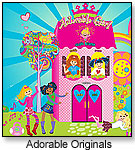 Companies are tackling safety concerns in different ways. For many, the new regulations mean removing questionable product, especially since testing is “very expensive and extremely time consuming,” as Gareth Turner, U.S. sales manager for Outset Media, pointed out.
Companies are tackling safety concerns in different ways. For many, the new regulations mean removing questionable product, especially since testing is “very expensive and extremely time consuming,” as Gareth Turner, U.S. sales manager for Outset Media, pointed out.
Outset eliminated six or seven products from its 2009 catalog because “we’re not sure if they’re 100-percent compliant,” Turner told TDmonthly.
To minimize safety concern on its “younger” Adorable Girl dolls, Adorable Originals opted for sewn-on instead of button eyes, and used Velcro instead of hardware on the outfits.
For more news, see TDmonthly's day-by-day coverage of the show.
Copyright © 2024 TDmonthly®, a division of TOYDIRECTORY.com®,
Inc.



 Toy Fair 2009, Feb. 15-18, managed a decidedly positive buzz despite recession woes and admitted hardships over compliance with the lead- and phthalate-restricting CPSIA. New York City’s Javits Center saw more than 1,100 exhibitors, down from last year’s 1,200+, and is estimated to have welcomed 10,000+ retail buyers, according to the Toy Industry Association. Although foot traffic seemed to be about 25 percent lighter than last year, given the drop of roughly 3,000 buyers, the show still held a promising vibe.
Toy Fair 2009, Feb. 15-18, managed a decidedly positive buzz despite recession woes and admitted hardships over compliance with the lead- and phthalate-restricting CPSIA. New York City’s Javits Center saw more than 1,100 exhibitors, down from last year’s 1,200+, and is estimated to have welcomed 10,000+ retail buyers, according to the Toy Industry Association. Although foot traffic seemed to be about 25 percent lighter than last year, given the drop of roughly 3,000 buyers, the show still held a promising vibe. "Toy Fair has been a lot more positive than I expected. There's no dark cloud,” Linda Hays, owner of Hopscotch Toys and Games in McMinnville, Ore., told TDmonthly Magazine. “There's less development of new product, but what there is, is good."
"Toy Fair has been a lot more positive than I expected. There's no dark cloud,” Linda Hays, owner of Hopscotch Toys and Games in McMinnville, Ore., told TDmonthly Magazine. “There's less development of new product, but what there is, is good." “Everything we’re trying to bring in is $19.99 and under,” expressed Christopher Grzych, sales facilitator for Sassafras. “People have to buy something; they just don’t have to go deep.”
“Everything we’re trying to bring in is $19.99 and under,” expressed Christopher Grzych, sales facilitator for Sassafras. “People have to buy something; they just don’t have to go deep.” “You just missed a major event … we wrote an order,” half-joked Barry Unger at the Kamhi World booth on Monday.
“You just missed a major event … we wrote an order,” half-joked Barry Unger at the Kamhi World booth on Monday. Prince Lionheart encouraged sales by waiving minimum orders, offering free shipping for the first time in the history of the company, and permitting buyers to email in orders a couple of weeks after the show, explained Jason Dalseme.
Prince Lionheart encouraged sales by waiving minimum orders, offering free shipping for the first time in the history of the company, and permitting buyers to email in orders a couple of weeks after the show, explained Jason Dalseme. Companies are tackling safety concerns in different ways. For many, the new regulations mean removing questionable product, especially since testing is “very expensive and extremely time consuming,” as Gareth Turner, U.S. sales manager for Outset Media, pointed out.
Companies are tackling safety concerns in different ways. For many, the new regulations mean removing questionable product, especially since testing is “very expensive and extremely time consuming,” as Gareth Turner, U.S. sales manager for Outset Media, pointed out.